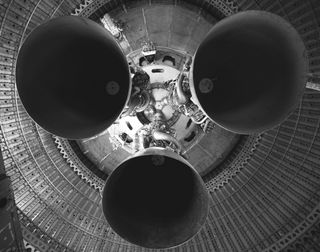SpaceX faces possible liquid oxygen shortage for rocket fuel amid pandemic
Liquid oxygen is in high demand.

COLORADO SPRINGS, Colo. — Liquid oxygen (LOX) is in short supply as demand rises with COVID-19 cases in the United States. But as hospitals struggle to figure out how to treat patients, SpaceX worries the shortage could also jeopardize upcoming launches.
With the rapid spread of the COVID-19 Delta variant, cases are on the rise as we push through the second year of the pandemic. Hospitals treating COVID-19 patients rely on LOX for ventilator treatments, and with rising numbers, LOX is becoming hard to find.
However, as SpaceX President and COO Gwynne Shotwell pointed out during the 36th annual Space Symposium here on Tuesday (Aug. 24), this shortage could impact upcoming launches, as many launch providers rely on LOX, a commonly used propellant.
"We're actually going to be impacted this year with the lack of liquid oxygen for launch," Shotwell said.
Related: Coronavirus pandemic: Full space industry coverage
"We certainly are going to make sure hospitals have liquid oxygen that we need," Shotwell added. "But for anybody that has liquid oxygen to spare, you can send me an email."
SpaceX's next-generation Raptor engine, which will power the company's huge new Starship deep-space transportation system, employs supercooled liquid methane and LOX as propellants. The company's previous engines, Merlin and Kestrel, have also used LOX, though with refined kerosene rather than methane.
Get the Space.com Newsletter
Breaking space news, the latest updates on rocket launches, skywatching events and more!
The reaction between propellants in a rocket engine creates heat and exhaust gases that are accelerated through a nozzle, creating thrust that pushes against Earth and propels the rocket up to space.
Shotwell did not specify the impacts that the LOX shortage might have on SpaceX's upcoming launch schedule. The company has already put Starlink internet satellite launches on hold since its last Starlink launch June 30. The company paused launches to add laser tech to its satellites.
In discussing the pause to upgrade the Starlink satellites during this same panel, Shotwell shared that she expects the next Starlink launch to happen in "roughly three weeks."
Email Chelsea Gohd at cgohd@space.com or follow her on Twitter @chelsea_gohd. Follow us on Twitter @Spacedotcom and on Facebook.
Join our Space Forums to keep talking space on the latest missions, night sky and more! And if you have a news tip, correction or comment, let us know at: community@space.com.

Chelsea “Foxanne” Gohd joined Space.com in 2018 and is now a Senior Writer, writing about everything from climate change to planetary science and human spaceflight in both articles and on-camera in videos. With a degree in Public Health and biological sciences, Chelsea has written and worked for institutions including the American Museum of Natural History, Scientific American, Discover Magazine Blog, Astronomy Magazine and Live Science. When not writing, editing or filming something space-y, Chelsea "Foxanne" Gohd is writing music and performing as Foxanne, even launching a song to space in 2021 with Inspiration4. You can follow her on Twitter @chelsea_gohd and @foxannemusic.
